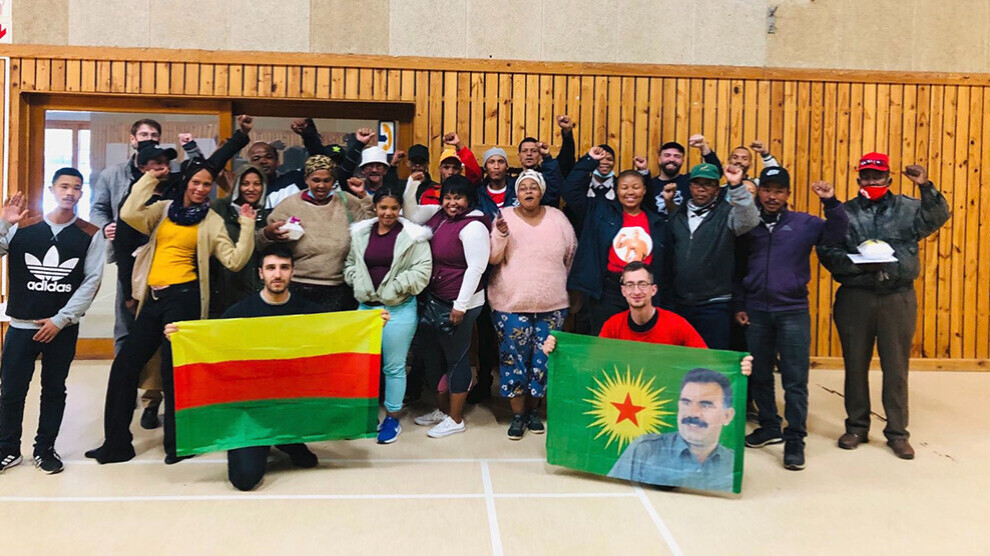Reality of farm workers in Vredendal: What has changed after the end of apartheid?
On the fifth day of the delegation, the members of the Kurdistan Youth Diplomacy Committee went to Vredendal, a town about 300km north of Cape Town.
On the fifth day of the delegation, the members of the Kurdistan Youth Diplomacy Committee went to Vredendal, a town about 300km north of Cape Town.

We publish the report written by the delegation of the Kurdistan Youth Diplomacy Committee in Vredendal.
On the fifth day of the delegation, the members of the Kurdistan Youth Diplomacy Committee went to Vredendal, a town about 300km north of Cape Town. Here, about 30 workers from the surrounding wine and orange farms gathered for a union meeting. The workers are members of CSAAWU (Commercial, Stevedoring, Agricultural and Allied Workers Union), an inclusive union that fights for the rights of agricultural workers.
The struggle of the almost exclusively black or colored (apartheid term for South Africans of mixed origin) agricultural workers is not limited to better working conditions and higher wages. Most of them live in the worst conditions in shacks and caravans owned by the white farm owners, exposing the workers to exploitation on several levels.
At any time, workers may be dismissed and/or evicted from their homes. In this case, they automatically become not only jobless but also homeless. One comrade told how he was laid off overnight after 20 years of working on a farm. With the help of his many years of experience, he had recently managed the work on the farm himself and kept it alive. Nevertheless, he is now faced with nothing without officially recognized qualifications, in a country with almost 50% unemployment.
But even the workers who are able to keep their jobs struggle daily to survive.
The farm owners unscrupulously exploit the massive supply of cheap labor to keep the living conditions of the workers as low as possible. Very few dwellings have access to sanitary facilities, families of several people often live together in one room, and there is no financial protection against loss of work. Children and young people on the farms are particularly vulnerable to these living conditions. Without playgrounds or other recreational facilities, tragic accidents occur time and again.
A comrade told the Kurdish delegation about a 2-year-old child who was hit and killed by an agricultural machine while playing a few weeks ago. Such accidents are not isolated cases, but have a system.
Since there is no protection against gang crime in contrast to the farmers' property, many workers keep guard dogs. This is answered by the farmers with the spread of poison, although the workers have often protested that their children get poisoned by the bait while playing.
In the exploitation of the workers, the farm owners focus particularly on the destruction of social structures. Thus, young people have to leave the farm and thus the parental home when they reach the age of 18. In their place, other workers are recruited so that the social bond of the family does not permit any exchange or even organization of the workers. The farm owners also try to divide the workforce through selective favoritism. For example, they take advantage of workers from surrounding countries, to whom they can pay even lower wages and with whom they can threaten the South African workers. These and other methods promote xenophobic tendencies and divide workers into groups along ethnic and skin color lines.
We see, then, that although the laws of the apartheid regime have been officially abolished and South Africa advertises that it has the most progressive constitution in the world, the situation at the grassroots level has hardly changed. Instead of skin color legally dividing society into categories, today's capital does so along class lines. Since this was determined by skin color and origin during apartheid, and since these structures were dissolved only on paper after 1994, the racist structure of the apartheid regime continues to permeate all sectors of society today and is particularly visible through the reality of the working class.
In order to fight against this reality, the organized workers of CSAAWU have drawn up a 23-point program in which they clarify their demands and organize new members. At their meeting, they also discussed the concrete actions for the next weeks and exchanged information about the developments on the respective farms. At the end of the meeting, the Kurdish delegation had the opportunity to talk to the workers about alternative forms of worker organization and the cooperative model that is being developed in northern and eastern Syria.
In short presentations about Democratic Confederalism, the revolution in Rojava and the role of women and youth, the delegates were able to give a theoretical background to these discussions.
At the end of the meeting, there was a determined and militant mood. One comrade summed up her motivation by saying, "We are not here to fight a war, but if it comes to war, we will fight."